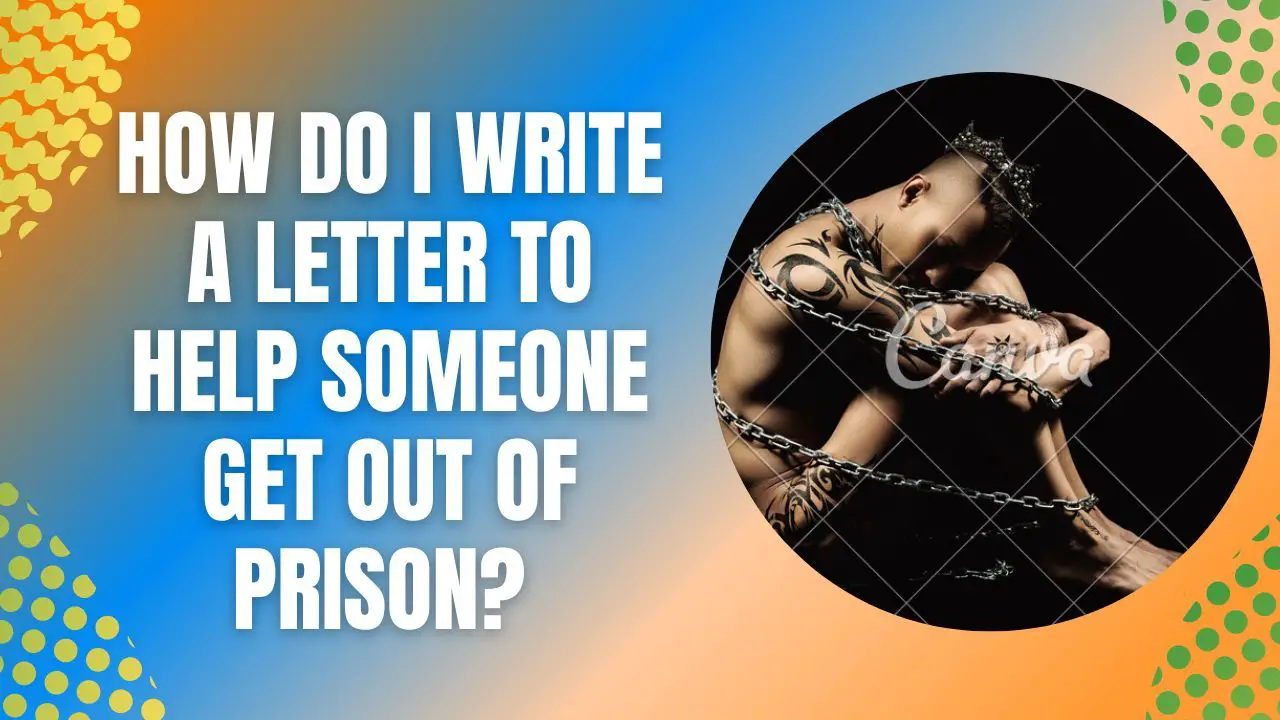How Do I Write A Letter To Help Someone Get Out Of Prison?
How Do I Write A Letter To Help Someone Get Out Of Prison? In this article, we have discussed how can you write a letter to someone to get out of the prison.

A letter to help someone get out of prison is known as a parole letter. These parole letters help the parole panel decide whether the offender should be set free or kept behind bars. A well-written parole letter will include various aspects as to why the board should set the offender free, including the following;
- Heartfelt, genuine, and thoughtful approach toward returning to the community
- Proof that the panel would provide the offender enough opportunities to reform
- An offender's ideas and goals for an improved life ahead
The judges usually only keep two significant thoughts in mind before deciding. The first is whether the offender has changed enough to be sent to the community again or not. Second, has the offender's character significantly altered or not? Once the offender or their supporter writing a parole letter proves it, the letter would automatically perform well with the parole panel.
Eligibility For Parole - How Commission Decides:
Before discussing the basics of writing a good parole letter, it is essential to know if the offender is even eligible for parole in the eyes of the Commission. Usually, the parole date is determined during the sentencing process.
As offenders recall their experiences, the most common reasons you get a minimum release date or parole date are;
- Are you maintaining good relations in prison or not causing any trouble?
- Are you a first-time offender or not
- Are your chances to re-offend are low
Typically, a criminal becomes eligible for parole after serving one-third of the sentence unless the court has set a minimum time for them to serve or given an "indeterminate" punishment. A criminal with a lifetime or 30+ years sentence becomes eligible for parole after ten years.
Once your parole is approved, you are released from prison, but not the conditions of parole. You still have to abide by specific rules and serve the remainder of your sentence outside prison walls.
How To Write A Parole Letter That Gets Approved?
The key features that determine if you have written a fruitful parole letter are given below;
Accountability:
Accountability is the most important thing you must remember while writing a parole letter. Many people make the mistake of excusing their offense or throwing shade on the opponent to show themself clean. This is a failed approach. You should take full accountability for the crime that you have committed.
Or if you are writing a parole letter in support of a potential parolee, you should never minimize the severity of any crime or be unclear in demonstrating anything being discussed in the letter.
Formatting is everything:
Use a proper format for writing a letter, whether you are writing on someone's behalf or for yourself. Given that it is an official business letter, it should be appropriately typed. Enter your name, address, date, and the parole board's address at the top of the letter. Put the prisoner's name and identity number beneath this.
Before sending your letter, run a check for proper grammar and spelling. Has the letter been proofread by another person? Use appropriate syntax, spelling, and a formal tone to increase your chances of being taken seriously.
Note that if you are writing for someone else, you must specify your relationship with the offender in detail and explain why you are writing them a letter for parole and what support you shall provide once their parole is accepted.
Be Respectful and sincere:
You do not have to lie about anything or exaggerate something in this letter. The more sincere and honest you sound, the better it is. Be respectful with everything you write in a parole letter and the words you use for it.
Address the letter with "Dear Respected Members of the Parole Panel" and use a colon after the salutation. Since it is a formal letter, ensure not to use any slang. Sign the letter with "Cordially" or "Sincerely" and leave space above your full name for the signature.
It is excellent to express emotions in your letter with sincerity. Express remorse for the crime you have committed and excitement and joy for your chance to join the community again. Share your plans and ideas that you wish to work on that will aid your personal growth, reducing the chances of such offenses in the future again.
Evidence of Improved Behavior:
Whether you are writing a parole letter for a friend or family, or yourself, it is crucial to share evidence of changed behavior. While incarcerated, what education did you receive, or what therapy did you attend? All of this needs to be mentioned in detail to present a strong letter of parole.
Future Aims:
Lastly, share what your future would look like if parole is granted. The parolee's family and friends outside of jail should show support. For people who have support outside prison, the chances of committing a crime again are less. Hence the board will look for it. Include your plans to assist the person after they are released from jail.
Do not lie about having a job, a place to live, or anything required unless it is confirmed. The court can see through a lie, and you would never want to face the repercussions of such an event. Not having a job or housing does not affect your chance of getting parole, but lying surely will.
How to Apply For Parole?
A criminal has to fill out a form/sign an application to apply for parole that is further furnished by the case manager. Unless a criminal is sentenced to a minimum ten years sentence, they will receive a hearing date to apply for parole within a few months of their arrival in the prison. In case the minimum is ten years, they will only get a hearing date six months before the end of their sentence.
At the parole hearing, a criminal is provided with an excellent opportunity to present his side of the story before the law. The court makes a decision that is both in the interest of an individual and doesn't affect the public's safety. Mainly, the case managers advise the offenders to express their regret for the crime they have committed and optimism for the future.
Throughout the hearing, various topics are raised. The court discusses everything from details of the offense, prior criminal history, the standards the Commission uses to make its decision, the offender's successes while incarcerated, the specifics of a release plan, to any challenges the offender has faced in the past, and likely to encounter in the future.
Frequently Asked Questions:
Q: What does "out on Parole" Mean? Out on parole means a person has been released from prison and is serving their remaining sentence outside of prison. People out on parole must abide by specific rules set by the state. It is different from probation.
Q: How does the Parole System Work? An early release is the simplest definition of the word parole. The eligibility criteria vary from the offense and the jurisdiction. After being granted parole, the parolee is freed from custody but is required to show that all parole requirements are being followed by maintaining regular communication with a parole supervisor.
Q: What Is a Parole Hold? If a person violates one or more parole conditions, and the law enforcement agency approves of it, they are detained on a parole hold. The panel may also deny such criminals their opportunity to pay bail.
Read more related articles;
- 9 famous prisons in the state of North Carolina
- 10 Famous Prisons in The State of Delaware
- 10 Famous Prisons in The State of Ohio
- 10 Best Prisons In The State of Ohio
- 10 Famous Prisons In The State of Texas
- Can You Visit Kerobokan Prison?
- How Does an Inmate File Taxes In The US?
- Can You go to Prison for Theft In the United States?
